Vietgone, Hamilton, and the Decolonization of American Theatre
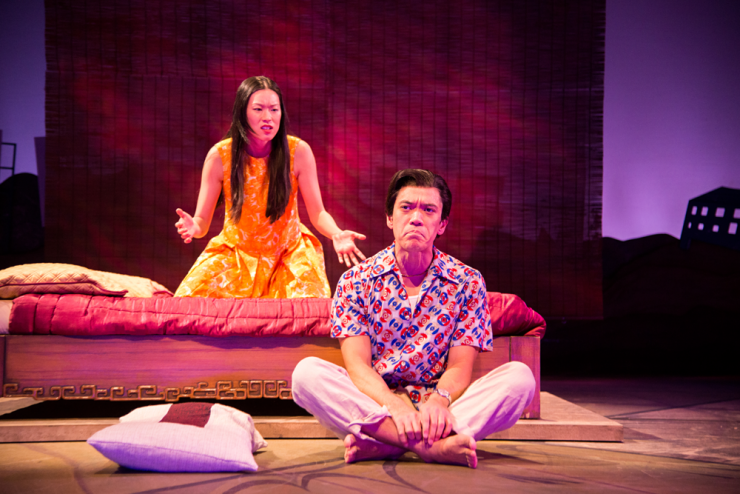
I grew up in the Commonwealth of Puerto Rico and I recently had the privilege of experiencing both Hamilton and Vietgone in New York and Seattle respectively. I had significantly different reactions to each of them, despite the common threads they share: they are both productions lead by and featuring people of color, they both use hip-hop as their musical component, and they both tell the stories of outsiders coming to this country. I believe coming from a colony (i.e. Puerto Rico) has shaped my understanding of these two important productions. This article aims to look at how colonization has impacted my experience and how it might influence my view of the place these two important plays are taking in American theatre.
A Brief Snapshot of Puerto Rico
The Commonwealth of Puerto Rico is defined by all official documents as an unincorporated territory of the United States. Some call it a colony, and some defend its “freely associated state” status vehemently. In the Commonwealth of Puerto Rico we have almost all the American corporate chain stores and businesses (Macy’s, Marshalls, Sears, JCPenny, etc.) and almost none of America’s privileges. Puerto Ricans living in the island receive less benefits from Medicare, Medicaid, and Social Security than those living in the States.
The people of the Commonwealth of Puerto Rico pay both federal and state taxes but have no representation in the Congress or the Senate. We do have a Resident Commissioner who is a non-voting member of the House of Representatives. Puerto Ricans are born citizens of the United States and—while Puerto Ricans are renown for the pride we take in our cultural heritage (look no further than the Puerto Rican parades in New York)—there is no such thing as a Puerto Rican passport or Puerto Rican citizenship. Puerto Ricans do not vote for President but serve in the military of the United States.
Hamilton
As Lin-Manuel Miranda (a fellow Puerto Rican) opened Hamilton on Broadway he revolutionized American theatre and started some of the deepest conversations around representation I have followed. Most seem to be thrilled with the presence of exclusively actors of color (AOC) on a Broadway stage. People rave about the reclaiming of American History as belonging to all of us and the proof that AOC are capable of representing characters who were not originally people of color, which has been a long-held excuse to continue to deny opportunities to AOC.
Living on the side of a mountain in rural Ireland instead of the lap of New England old money, Mag and Maureen coexist in a home of isolation and dysfunction. This home…unites a mother and daughter in a trinity of dilapidation.
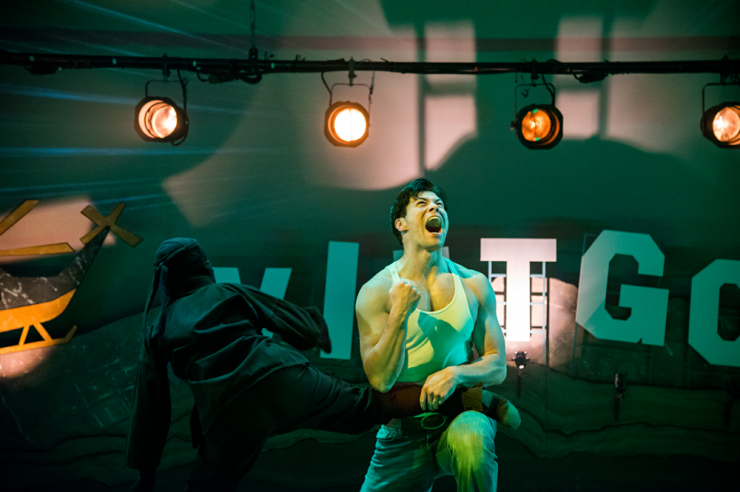
Some, find problematic that AOC are representing (and glorifying) the history of the creation of a nation and systems that purposefully have oppressed people of color. Some dissect what it means for AOC to perpetuate the ever-so-American value of “pulling oneself by our bootstraps” when the lack of equitable opportunities and resources has been widely documented over the years. And some question the choice of having black actors portray slave-owners as well as the lack of any meaningful acknowledgment of slavery in the play.
I must say, as I was extremely lucky to secure a ticket to watch this production on Broadway last year, the taste in my mouth sided more with the second group of people. Full disclosure: I am not a musical theatre lover and I hadn’t even listened to the cast recording once when I took my seat. Not having really spoken English fluently until I was twenty-one, combined with the fast hip-hop beats, meant I couldn’t understand at least 75 percent of the words said. I also felt the constant fast pace of the show didn’t allow for me as a first time audience member to fully identify with the characters and thus, the dramatic moments didn’t really land.
It was not until I saw Vietgone seven months later that I could really articulate what was missing for me in Hamilton.
Vietgone
Vietgone, by Qui Nguyen tells the story of Vietnamese refugees as a result of the Vietnam War. What makes Vietgone special is its language subversion. Here, we see two characters whose first language is Vietnamese speak in colloquial, cool, native, and relaxed English without foreign accents. We see American characters speak in disconnected words to bring life to the language barriers the protagonists were facing in a way that all audiences can understand. Playwright Qui Nguyen cleverly sets up his language device at the opening of the play:
PLAYWRIGHT
(…)
To begin, this is a story about a completely made-up man named Quang.
Lights up on QUANG.
(…)
PLAYWRIGHT
And though they are Vietnamese—born and raised there—for the purposes of this tale, it is to be noted that this will be their speaking syntax:
(…)
QUANG
Any of you fly ladies wanna get up on my “Quang Wang”?
PLAYWRIGHT
Which is the opposite of this one:
(…)
ASIAN GUY
Fly Lice! Fly Lice! Who rikey eating fly lice?
PLAYWRIGHT
And on the occasion - when it occurs - that an American character should appear, they will sound something like this:
AMERICAN GUY
Yee-haw! Get’er done! Cheeseburger, waffle fries, cholesterol!
PLAYWRIGHT
Spouting American nonsense, which sounds very American but yet incredibly confusing for anyone not natively from here.
Even though I am not Vietnamese, this opening validated my existence in a way no theatre experience had ever done before. There they were, characters for whom English is not their first language being represented with the full range of expression they would have had in their native tongue.
Even though I am not Vietnamese, 'Vietgone's' opening validated my existence in a way no theatre experience had ever done before.
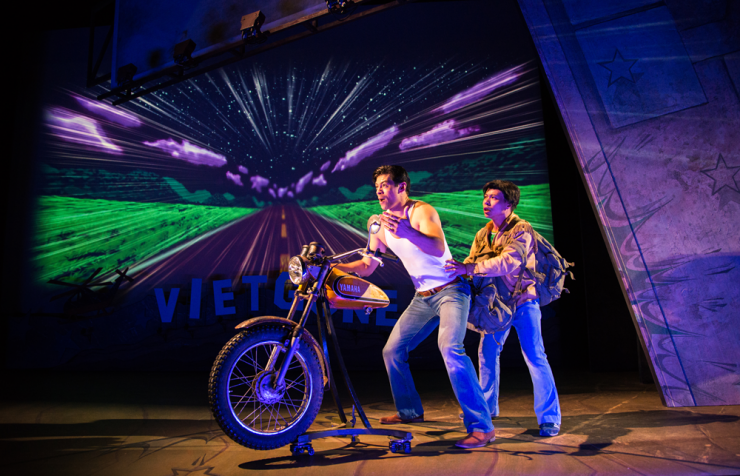
Furthermore, Vietgone represents American characters trying to speak Vietnamese by using broken syntax to show, not only the different linguistic structures of Vietnamese versus English, but also the inadequacy that is inherent in trying to speak a language that is not your own. It shows the effort English language learners exert even when we get things wrong and the vulnerability we step into in doing so. Here is a passage that illustrates Qui’s unorthodox use of English words to illustrate Vietnamese characters speaking their native language vs foreigners putting in so much effort to still not succeed:
TONG
Your Vietnamese is getting better.
(…)
BOBBY
Seeing you for original time was love in eyeball originals.
TONG
What?
BOBBY
No. That’s all wrong. Frickles!
TONG
Say it slow.
(…)
BOBBY
Seeing you for first time was love in sight first.
TONG
Oh.
Like Hamilton, Vietgone uses hip-hop as its music genre of choice. Unlike Hamilton, the hip-hop in Vietgone is in slower tempos and it is only used to highlight highly emotional moments in the play as opposed to the main vehicle for story-telling.
As I left the theatre from Vietgone I started articulating the questions that lead to writing this article.
Two Immigrant Stories, Two Impacts
While both shows feature casts with all AOC and tell an “immigrant story,” Hamilton doesn’t focus on a specific race and uses AOC to tell a white narrative, whereas Vietgone centers around a very specific Vietnamese narrative. Both shows use hip-hop (a black art form) to further the story and connect with modern audiences. What is the difference between Hamilton using hip-hop to tell the story of the Founding Fathers and Vietgone using it to tell the story of Vietnamese refugees? Why did I leave Hamilton feeling confused and concerned while I left Vietgone feeling seen, validated, and empowered? Is Hamilton acting from a place of internalized colonization?
Like Puerto Rico, Hamilton actors are investing their talent, bodies, time, and skills to further a narrative that has historically never served them. Our Founding Fathers narrative has never acknowledged, nor reciprocated the contributions of pe

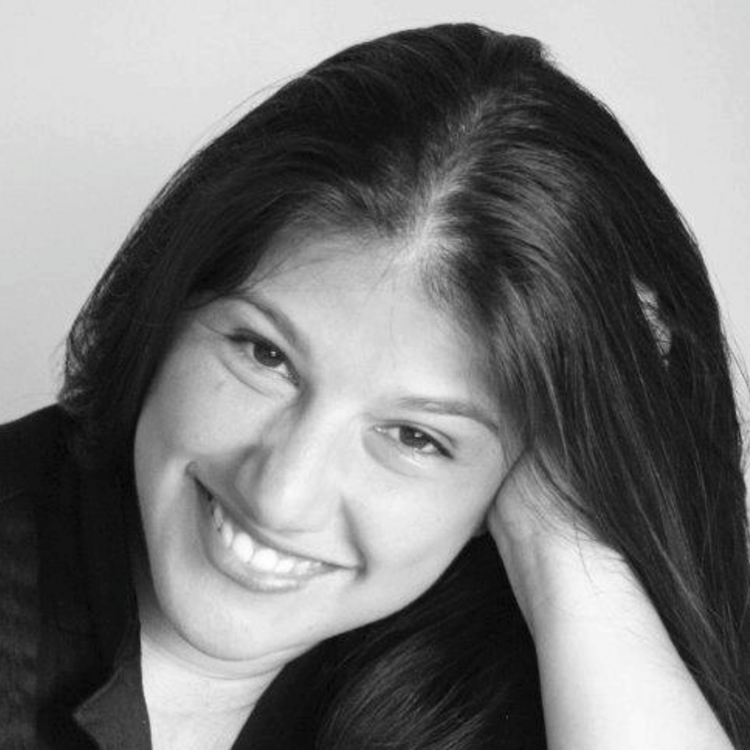
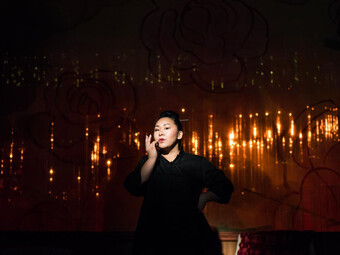


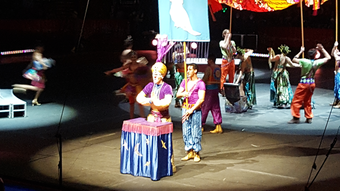

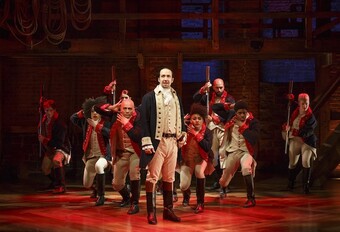

Comments
The article is just the start of the conversation—we want to know what you think about this subject, too! HowlRound is a space for knowledge-sharing, and we welcome spirited, thoughtful, and on-topic dialogue. Find our full comments policy here
"Hamilton actors are investing their talent, bodies, time, and skills to further a narrative that has historically never served them... with their fierce moves telling a story of white supremacy... to further the narrative of the oppressor."
Even though I'm no fan of Hamilton (the man; I haven't been able to see the musical yet), I still gotta say "ouch" on the behalf of Lin-Manuel Miranda and hope that somebody warned him to beware the Ides of March!
I guess March 15, 2017 will be remembered as the day the backlash against "Hamilton" truly and earnestly began.
Arlene,
I'm curious to know why would write an analysis of a production in which you "couldn’t understand at least 75 percent of the words"? Wouldn't a rigorous comparison of the two productions require the observer to have a more complete understanding of the text?
I can see your point, Phillip. The beauty of theatre (in my opinion) is that text is one (yes, arguably the most important, in many cases) of the many elements that contribute to story-telling. I saw a production of As You Like It in Moscow where I didn't understand one word, yet, I left deeply affected and moved. While I couldn't pick out every single word in Hamilton, I feel I left with a clear understanding of the story it was trying to tell and the devices it was using to tell it. I am not trying to present a rigorous analysis of the texts, but rather, to make sense of my experience of both productions.
Interesting thoughts, Arlene! I, like you, love the subversion of language in "Vietgone."
As someone who's also seen both, though, here's a question I have: do you think it is possible, in the performance of "Hamilton," for AOC to reclaim and REPURPOSE the American founding myth to serve the needs of PoC? I left the show feeling that that was its purpose (I can't say whether it accomplished that or not). Is such a thing possible?
Hello Nicholas,
This is an excellent question. What needs of PoC would this reclaiming and re-purposing serve, you think? I am curious.
Hmmmm. "Needs" might honestly be too strong a word--bad choice on my part--but it did seem to me that "Hamilton" intended to give PoC a renewed (or simply new) sense of agency and ownership of the American myth and project. To put it another way, you point out (rightly) that the founding of America is wrapped up in white supremacy and was never something that served PoC. I guess the question is, can PoC make the ideas of America serve them by claiming it for their own? Can they, in so doing, energize their community to make more and further demands on America and point to the similarities between them and the young rebels who made up the start of the American project?
There might be other benefits too (eg. white people viewing PoC better as a result of Hamilton) but that was the core of my question. I feel like I may not be articulating it well.